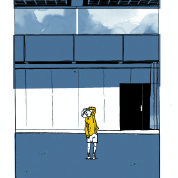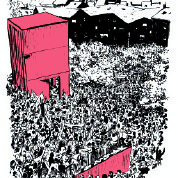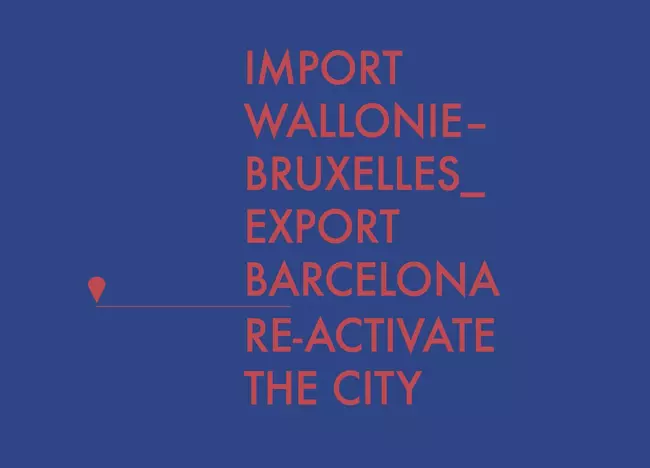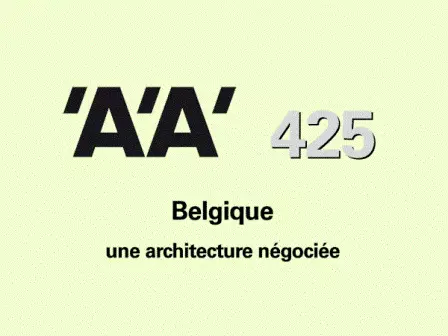- Posts
Published on 24/10/2016
"Foreword" Architectures Wallonie-Bruxelles # 2 Inventories 2013-2016
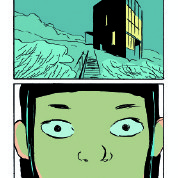
© WBA Since it came out, the publication Inventaires is an opportunity to react to, evaluate and account for architecture and its creators in Wallonia and Brussels.
The period 2013-2016 was marked by the presence of our architects in the media in Belgium and abroad. Publications, exhibitions, and participation welcomed in the biennials... The confidence in our project creators has started to grow. This view from outside speaks to us about an engaged, well-constructed architecture, with a rather low budget. This connection to a particular ethic serving the sponsor is often prioritised. The dynamic materializes by the opening up to international architects, who are important to compete with.
During this (international) period of questioning, we are searching for leads for the future. How can we give form to, and produce, an architecture which is “in line” with social, environmental and formal challenges?
We tried to organise our inventory by the plurality of the documentary sources, of the testimonies collected, and also by the view of different authors from different media, namely writing, drawing, comics, and photography following new forms of journalism which are “the 1”, mooks such as Revue XXI, 24h01 or Médor here.
As directors of Inventaires #2, we concentrated on the form so that the investigation of the terrain, the confrontation with the realisation, and the testimony of the reception of the architecture by the users would be possible. From now on, the short-lived activities (conferences, exhibitions) have been stopped; another condition to be included in the inventory is that the architect belongs to the Francophone Order of Architects.
The architecture unit, which promotes an architecture of the creator by implementing procedures for access to public procurement, and Wallonie-Bruxelles Architectures, which promotes Belgian Francophone architects internationally, are subject to editorial management on the same basis. It is a call for projects where the intentions and the way to do something (“manière de faire”, Jacques Rancière, 2000) are defined as well as the level of methodology of the survey of projects, as for the publication. We must welcome this risk taking of the sponsors who invite experimental opening towards other media and towards other authors who are outside of the classic field of architecture.
As for the previous Inventaire, the projects presented in the work are issued from a large survey. Attention was paid in particular to the type of order and the relations between architects, clients and occupants. This survey, which represented an important part of our work, generated observations shared in certain texts and comments of the jury. It allowed themes such as negotiation and interconnection between architecture and public space to be revealed which are included in this exhibition together with the publication of the book. The empirical approach at the heart of this survey was therefore very productive and rich in information.
Inventaires #2 (the third edition after Inventaires #0 and Inventaires #1) picks up where the last left off, inspired by the exhortation of Françoise Fromonot who called for architectural critique to be revisited by proposing a fuller analysis, and giving insights into diverse orders. A critique which does not only treat the point of view of the architect, but which takes analyses and multiple testimonies into account, which is formulated as follows, and highlights the interest in the method and the form in research:
“[…] It is this way of considering architecture which generally prevails in criticism, founded on the presentation, the interpretation and possibly the evaluation of the strategy of the client in terms of the site and the program. It [...] is more often practised in professional reviews, above all those read by those who are published in them: the architects. […] Most often, it neglects to support its subject with facts and arguments from different registers to those which it rightly or wrongly believes to be the most natural: the commentary of the project. Not that this exercise is useless, as it can do justice to the role and to the contribution of a neglected profession. [...] The response to a question which calls for polyphony cannot be unequivocal.“
The idea, which has been suggested many times, that an inventory is a snapshot of production in a territory (Inventaires #1, Belgian prize for architecture A+) is therefore not fully adapted to this edition here. If we follow the analogy with image vocabulary, our inventory is more similar to a long take in its duration. A long take made in two movements,: surveying and classification determined by the international jury (October 2015-February 2016) and then the comments of the jury who handover to the contributors (writers, photographers and comic authors) by proposing a personal reading for you (February 2016-October 2016).Abstract of the foreword written by Xavier Lelion and Anne Sophie Nottebaert
- BilletsAuteur
Audrey ContessePublished on 09/10/2018
-
Allier procédure et processus
"La scène belge est gage de qualité, d’humanisme et de poésie" peut-on lire dans le numéro 425 de l’Architecture d’Aujourd’ hui, dévolu à l [...]
- BilletsAuteur
Emmanuelle BornePublished on 06/07/2018
-
Belgitopie
Faut-il se fier aux expositions internationales, a fortiori à la Biennale d’architecture de Venise, pour appréhender les mouvements de fond et enjeux [...]

